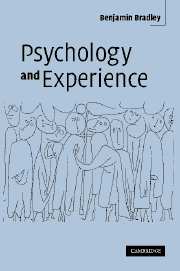Book contents
- Frontmatter
- Contents
- List of illustrations
- Preface
- Acknowledgements
- 1 Introduction
- 2 Learning from experience
- 3 From here to synchrony
- 4 What to make of coincidence
- 5 The topography of intersubjective space
- 6 The two axes of psychological explanation
- 7 Pictures of psychical change
- 8 Research among equals
- 9 Validating the curriculum
- 10 Conclusion
- List of references
- Index
9 - Validating the curriculum
Published online by Cambridge University Press: 22 September 2009
- Frontmatter
- Contents
- List of illustrations
- Preface
- Acknowledgements
- 1 Introduction
- 2 Learning from experience
- 3 From here to synchrony
- 4 What to make of coincidence
- 5 The topography of intersubjective space
- 6 The two axes of psychological explanation
- 7 Pictures of psychical change
- 8 Research among equals
- 9 Validating the curriculum
- 10 Conclusion
- List of references
- Index
Summary
There are actually two types of science which are beginning to diverge in the civilization of danger: the old, flourishing laboratory science, which penetrates and opens up the world mathematically and technically but is devoid of experience, and a public discursivity of experience which brings objectives and means, constraints and methods controversially into view.
(Ulrich Beck, 1997, The Reinvention of Politics, p. 123)A colleague and I are currently in the midst of an interview-study which examines the experiences of people who have just made their first steps into the workforce after graduating in psychology. Already, concerns are emerging. The strongest is the graduates’ sense of being seriously under-prepared for the challenges of working as a psychologist. For example: ‘At the end of my honours year I really wasn't qualified to do anything much’ (#6). ‘I really found that in my first three years … it was so theoretical, I didn't feel like there was anything practical whatsoever, which is … what psychology is all about, you know, the hands on dealing with people kind of thing’ (#7). Another says: ‘The psychology course … really didn't provide me with any sort of skills that I could see could be useful to me in the workplace’ (#3).
- Type
- Chapter
- Information
- Psychology and Experience , pp. 186 - 204Publisher: Cambridge University PressPrint publication year: 2005



